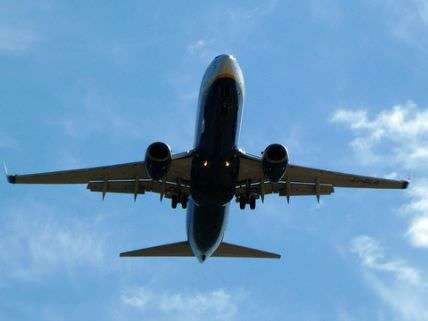We Can Tell You That You Can't Fly; We Can't Tell You Why
The government resists divulging the reasons for stripping people of the right to travel by air.

Last year, in response to an ACLU-sponsored lawsuit, U.S. District Judge Anna Brown ordered the federal government to create an appeals process for people placed on the "no fly" list that prevents travelers from boarding flights to, from, within, or across the United States. Last spring the Department of Homeland Security began telling travelers barred from flying whether they were on the list and, if so, informing them of their right to initiate a "redress inquiry." But it's hard to get off the list if you don't know why you were put there to begin with, and the government says it can't be specific because that would endanger national security.
"By its very nature, identifying individuals who 'may be a threat to civil aviation or national security' is a predictive judgment intended to prevent future acts of terrorism in an uncertain context," two Justice Department officials say in a May 28 brief quoted by Spencer Ackerman in The Guardian. "Judgments concerning such potential threats to aviation and national security call upon the unique prerogatives of the Executive in assessing such threats." In other words: We know what we're doing; you'll just have to trust us.
The government says the standard for being placed on the no-fly list is "reasonable suspicion," which is weaker than the "probable cause" required for an arrest or a search warrant. As the Supreme Court explained in the 1968 case Terry v. Ohio, reasonable suspicion is more than an "inchoate and unparticularized suspicion or 'hunch.'" It is supposed to be based on "specific and articulable facts…taken together with rational inferences from those facts."
What that means in practice is anybody's guess. Terry, which involved brief detentions and pat-downs of people believed to be involved in criminal activity and possibly armed, was the legal basis for New York City's widely criticized stop-and-frisk program, which correctly identified lawbreakers 12 percent of the time and correctly identified people with weapons 2 percent of the time. Given how rare terrorist attacks on airplanes are, the no-fly list is likely to be considerably less accurate at identifying people hatching such schemes. The Associated Press says the list includes "tens of thousands of people." Last Friday the ACLU told Judge Brown the government's predictive methods are subject to an "extremely high risk of error."
That question is pretty hard to assess, since it hinges on counterfactual speculation about what people might have done if they had been allowed on airplanes. But the plaintiffs in the ACLU suit would at least like to know the sort of evidence the government uses to arrive at its supposedly reasonable suspicions. Is it "details about an airline passenger's friendships, travels, [and] financial transactions," as A.P. suggests? Ackerman cites a leaked internal document that says social media posts are one acceptable source of evidence, and he notes that some Muslims have complained they suddenly appeared on the no-fly list after declining to become FBI informants.
One thing is clear: People barred from flying need not have been charged with any offenses related to terrorism, let alone convicted. An arrest, after all, requires probable cause. For the most part, it seems, people get on the list not because of what they've done but because of what they might do.
The DOJ allows that picking people for the list "requires predictive assessments about conduct that may or may not occur in the future." The government says it can't say much more than that, however, because divulging the criteria for the no-fly list would help terrorists avoid detection. "If the Government were required to provide full notice of its reasons for placing an individual on the No Fly List and to turn over all evidence (both incriminating and exculpatory) supporting the No Fly determination," an FBI official told Brown, "the No Fly redress process would place highly sensitive national security information directly in the hands of terrorist organizations and other adversaries."
But if you don't know why you are on the no-fly list, it is pretty hard to argue that you should be removed, which renders meaningless the appeals process that Brown said is constitutionally required. Another problem: So far the government is insisting that the director of the Transportation Security Administration must have the final word on who deserves the right to travel by air.
